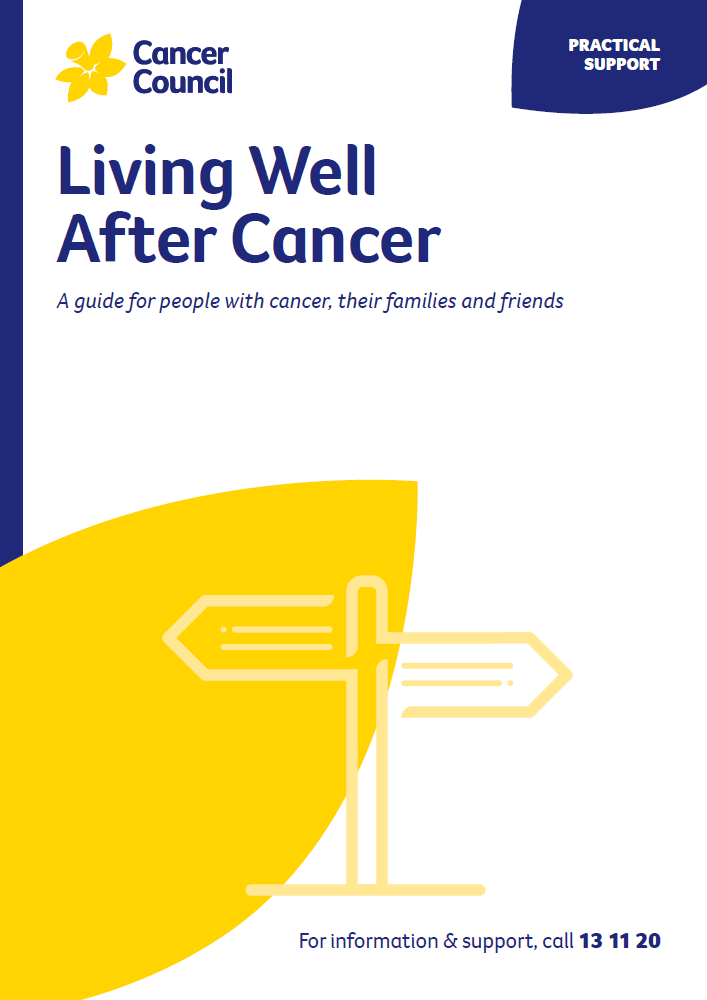- Home
- Chronic myeloid leukaemia (CML)
- Life after treatment
Life after treatment for CML
For most people, treatment for chronic myeloid leukaemia (CML) can continue on and off for years. Life between treatments can present its own challenges. You may worry that every ache and pain means the leukaemia is coming back.
Learn more about:
- Overview
- Follow-up appointments
- Dealing with feelings of sadness
- Looking after yourself
- If CML returns
Overview
Some people say that they feel pressure to return to “normal life”. It is important to allow yourself time to adjust to the physical and emotional changes, and establish a new daily routine at your own pace. Your family and friends may also need time to adjust.
Cancer Council 13 11 20 can help you connect with other people who have had leukaemia, and provide you with information about the emotional and practical aspects of living well after treatment.
For more on this, see Living well after cancer.
Follow-up appointments
After your treatment, you will have regular appointments to monitor your health, manage any long-term side effects and check that the leukaemia hasn’t come back or progressed. During these check-ups, you will usually have a physical examination and blood tests, and you may have a chest x-ray and scans.
If you are taking tyrosine kinase inhibitors (TKIs) for CML on a long-term basis, you will also need to have regular blood tests to measure the BCR-ABL gene. These blood tests are a condition of the Pharmaceutical Benefits Scheme (PBS), which covers most of the cost of the TKIs.
When a follow-up appointment or test is approaching, many people find that they think more about the leukaemia and may feel anxious. Talk to your treatment team or call Cancer Council 13 11 20 if you are finding it hard to manage this anxiety. Between check-ups, let your doctor know immediately of any symptoms or health problems.
Dealing with feelings of sadness
If you have continued feelings of sadness, have trouble getting up in the morning or have lost motivation to do things that previously gave you pleasure, you may be experiencing depression. This is quite common among people who have had cancer.
Talk to your GP, as counselling or medication – even for a short time – may help. Some people can get a Medicare rebate for sessions with a psychologist. Ask your doctor if you are eligible. Cancer Council may also run a counselling program in your area.
For information about coping with depression and anxiety, call Beyond Blue on 1300 22 46 36. For 24-hour crisis support, call Lifeline 13 11 14.
The Thing About Cancer podcast
Listen to our podcast The Thing About Cancer for information and insights that can help you navigate through the challenges of living with cancer.
Looking after yourself
Cancer can cause physical and emotional strain, so it’s important to look after your wellbeing. Cancer Council has information and programs to help you during and after treatment. Call 13 11 20 to find out more, or see Managing cancer side effects, Exercise after a cancer diagnosis, Complementary therapies, Emotions and cancer, Nutrition and cancer, Sexuality, intimacy and cancer, Fertility and cancer, and Living well after cancer.
Alternative therapies are therapies used instead of conventional medical treatments. These are unlikely to be scientifically tested and may prevent successful treatment of the cancer. Cancer Council does not recommend the use of alternative therapies as a cancer treatment.
If CML returns
In many cases, treatment will make the leukaemia symptoms ease or disappear for a period of time. This is called remission. People with CML who are being treated with TKIs may also have times when the leukaemia is no longer controlled or transforms to a more advanced phase.
If you have a relapse or the disease transforms, further treatment can usually be given to control the leukaemia. This may lead to another remission. In some situations, doctors may recommend a stem cell transplant.
Watch this video to see why eating well is so important after a cancer diagnosis, and what you can do to maintain a healthy diet.
Research shows that exercise benefits people with cancer during and after treatment. Find out more in this video or see our other exercise videos.
Dr Chun Kei Kris Ma, Clinical Haematologist, Western Sydney Local Health District (clinical update); Delphine Eggen, Consumer; Dr Robin Gasiorowski, Staff Specialist, Haematology, Concord Hospital; Karl A Jobburn, Haematology Clinical Nurse Consultant, Liverpool Hospital; Yvonne King, 13 11 20 Consultant, Cancer Council NSW; Heather Mackay, Clinical Nurse Consultant, Westmead Hospital; Jennifer Paton, Consumer.
View the Cancer Council NSW editorial policy.
View all publications or call 13 11 20 for free printed copies.
